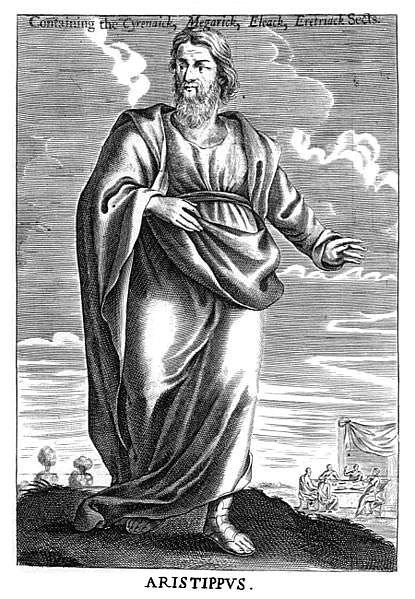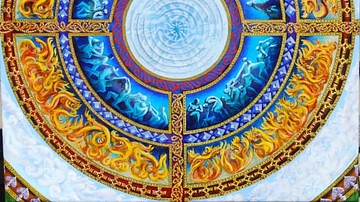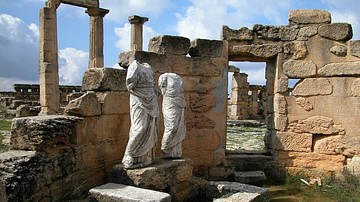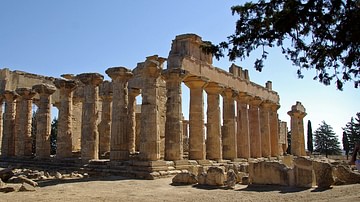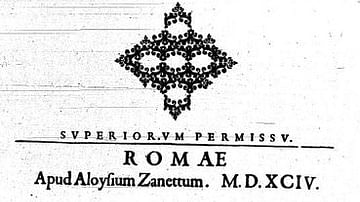
Yang Zhu (l. 440-360 BCE, also known as Yang Chou or Yang Chu) was a hedonist philosopher who lived and wrote during The Warring States Period in China. Little is known of his life but his work survived through the writings of the great Confucian philosopher Mencius (l. 372-289 BCE) who condemned his ideas, as well as those of the Mohist philosopher Mo Ti (l. 470-391 BCE), who advocated for universal love without regard to social status, as subversive and dangerous.
Yang Zhu was initially a Taoist teacher who abandoned his faith and position for hedonism, most likely because he felt Taoism did nothing to alleviate the human suffering he saw all around him. The Warring States Period (481-221 BCE) was a time of continuous strife in ancient China as the seven states fought each other for supremacy until the state of Qin defeated the others and established the Qin Dynasty (221-206 BCE). Yang Zhu lived in the earlier part of this period when none of the states could gain an advantage over the others but seemed to believe the next assault, and then the next, would change that dynamic when all these campaigns did was increase the already vast numbers of the dead. The lives of the people these separate states fought to rule were regarded as expendable, and an individual life, already brief, could be cut even shorter at any time and for any reason.
Accordingly, Yang Zhu refused to participate in the madness any longer and dedicated himself to hedonism. He developed his philosophy on the platform of four central truths he believed were self-evident:
- Life is suffering for which there is no remedy
- There is no God, no afterlife, and nothing other than the physical world
- The wicked and the righteous live and die equally without punishment or reward
- The pursuit of pleasure is the only appropriate response to life and its highest goal
Yang Zhu seems to have been aware that Lao Tzu (l. c. 500 BCE), the legendary founder of Taoism, exiled himself from China once he understood that his efforts had not changed the people's hearts and that Mo Ti had also failed in achieving this same goal. He, therefore, dedicated himself to minding his own business and living his life according to these four principles.
Although the motivation and inspiration may be different, Yang Zhu's philosophy is comparable to other hedonist systems such as that of the Charvaka school in India and those of Aristippus of Cyrene (l. c. 435-356 BCE) and Epicurus (l. 341-270 BCE) of Greece. When the first emperor of the Qin Dynasty, Shi Huangdi (r. 221-210 BCE), came to power, he burned any books which did not align with his strict legalism, and among these were the works of Yang Zhu. His philosophy is only preserved through the works of others who sought to refute his four principles and discredit his teachings.
Beliefs & Arguments
The event which motivated Yang Zhu to abandon a respectable position as a Taoist teacher to embrace hedonism is unknown but, based on the fragments of his works cited by Mencius, he had come to reject the values of Chinese culture as absurd fantasies devoid of any final meaning. He seems to have concluded that the unending misery of the Warring States Period was encouraged by these values which claimed a legitimacy they did not have and only trapped people in a cycle of war, privation, and death. Belief in so-called “right conduct” did not result in people behaving well, he noted, nor did prayer and supplication to a higher power bring anything but a continuation of suffering and sorrow. Historian Will Durant summarizes Yang Zhu's basic philosophy:
Life is full of suffering [and so] its chief purpose is pleasure. There is no god…and no afterlife; men are the helpless puppets of the blind natural forces that made them, and that gave them their unchosen ancestry and their inalienable character. The wise man will accept this fate without complaint, but will not be fooled by all the nonsense of Confucius and Mo Ti about inherent virtue, universal love, and a good name: morality is a deception practiced upon the simple by the clever; universal love is the delusion of children who do not know the universal enmity that forms the law of life; and a good name is a posthumous bauble which the fools who paid so dearly for it cannot enjoy. (679)
Citing four great men, and two of the evilest, Yang Zhu argued that the virtuous life has no profit while the life of sensual enjoyment, no matter how vile one's reputation, is the only meaningful one. He examined the lives of Shun and Yu, notable hero-kings of the pre-historic Chinese Xia Dynasty (c. 2070-1600 BCE) who exemplified virtue, along with the lives of the two other sages, Chou-Kung and Confucius, and compared them with two of the greatest villains in Chinese history, Emperor Chieh (also known as 'Jie', the last emperor of the Xia Dynasty) and Emperor Chou Hsin, last emperor of the Shang Dynasty (1600-1046 BCE). 
Through a careful comparison and contrast of the lives of these six figures, Yang Zhu concluded that it is better to live for one's own pleasure than to concern oneself with others or with how one is remembered. Durant cites Yang Zhu's conclusion:
These four sages, during their lives, had not a single day's joy. Since their death they have had a fame that will last through myriads of ages. But that fame is what no one who cares for what is real would choose. Celebrate them – they do not know it. Reward them – they do not know it. Their fame is no more to them than to the trunk of a tree, or a clod of earth. On the other hand, Chieh came into the accumulated wealth of many generations…He indulged the pleasures to which his eyes and ears prompted him; he carried out whatever it came into his thoughts to do. Of all mortals never was one whose life was so luxurious and dissipated as his. Chou Hsin came into the accumulated wealth of many generations…he indulged his feelings in all his palaces, he gave the reins to his lusts through the long night, he never made himself bitter by the thought of propriety and righteousness. These two villains, during their lives, had the joy of gratifying their desires. Since their death, they have had the evil fame of folly and tyranny. But the reality of enjoyment is what no fame can give. Reproach them – they do not know it. Praise them – they do not know it. Their ill fame is no more to them than the trunk of a tree, or a clod of earth. (680-681)
Even so, Yang Zhu did not believe one should emulate Chieh and Chou Hsin in their wickedness, only in their lack of regard for what others thought of them and in their pursuit of pleasure. He would have found approval with the hedonists of Greek philosophy, Aristippus of Cyrene and Epicurus, in that, like them, he believed pleasure was not necessarily only the pursuit of physical gratification but simply pursuing that which was good for oneself and in one's own best interests.
Like Epicurus, Yang Zhu would argue that reading a book or taking a walk in the woods is as pleasurable as drinking too much wine and all forms of enjoyment are worthy of pursuit. As humans are animals, and animals act out of self-interest, humans should do likewise. At the same time, however, he condemned those in power who used their positions to further their own ends, believing that one should be prudent in the exercise of authority over others. Essentially, by accepting a position of power, one had pursued one's pleasure and now had to 'pay' for it by exercising that power responsibly. He considered those in government who placed their personal desires above the just rule of the people to be despicable.
Greek Hedonism & Indian Charvaka
This same view was also held by Aristippus of Cyrene, a former student of Socrates, whose views closely mirror those of Yang Zhu. Aristippus may have developed his hedonistic outlook after Socrates was executed by the Athenians in 399 BCE, though this is unclear. Whatever he learned from his master regarding ultimate truths and morality, however, was abandoned by the time he came to live at the court of Dionysius I of Syracuse (l. c. 432-367 BCE) where he held the position of counselor but spent most of his time indulging himself in various sensual pleasures at Dionysius I's expense. In Aristippus' view, it seems, there was nothing one could do about a monarch behaving irresponsibly and the best one could do was benefit from a court position by getting what one could from it while it could be had.
Aristippus is best known for his phrase “I possess, I am not possessed” by which he meant he could engage in pleasurable pursuits without those pleasures defining him through attachment. The objects of pleasure had no final meaning; their pursuit and enjoyment – no matter how fleeting – were what mattered. In speaking of a courtesan he was sleeping with, he is said to have commented that he had her, she did not have him. Enjoyment for its own sake, not for any end, was the highest goal one could work toward in life and other people were simply obstacles or aids in reaching that goal.
This view corresponds closely to Yang Zhu's own in that Mencius characterizes his philosophy as nothing more than selfishness disguised as a “philosophy” whereby Yang Zhu sought to transform people into wild beasts without regard for propriety or each other. Epicurus' hedonism does not match Yang Zhu's quite as closely since, contrary to popular thought, Epicurus did not encourage a life lived in pursuit of pleasure which was heedless of consequences or the feelings of others. Epicurus believed that pleasure was the highest good but should be pursued thoughtfully and in moderation so that one could maintain one's health and enjoy life for as long as possible.
A very close parallel to Yang Zhu's thought, however, comes from India in the form of the philosophical school of thought known as Charvaka which is thought to have been established by one Brhaspati c. 600 BCE. Nothing is known of Brhaspati's life, but his philosophy was a reaction against what he saw as the tyranny of organized religion by which the priestly class grew wealthy at the expense and impoverishment of the lower classes. Brhaspati, like Yang Zhu, claimed that there was no God, that religion was an invention of the strong to exploit the weak, and that the ultimate good in life was the pursuit of pleasure.
Charvaka, like Yang Zhu's philosophy, rejected any claims regarding the existence of supernatural entities, the efficacy of religious thought and practice, and any claims regarding truth that did not come from an individual's direct perception of any given phenomena. Life is short, Charvaka claimed and, in the absence of any higher power, one's only obligation was to one's self and one's own enjoyment. Yang Zhu would have completely agreed with this vision.
Response to Suffering & Selfishness
Brhaspati's philosophy most likely developed in response to the suffering he witnessed caused by an upper class who grew wealthy at the expense of those already suffering, and Yang Zhu's views were almost certainly formed by this same kind of observation. He justified his abandonment of Taoist principles for a Chinese philosophy focused on self-interest by noting how meaningless the supposed “virtues” of his society were and how, no matter how hard one might try, nothing ever changed the fundamental selfishness of human nature.
In one way, Yang Zhu's philosophy could be characterized by the old phrase, “If you can't beat 'em, join 'em” in that his very apparent selfishness was simply an honest expression of what others engaged in all the time but hid behind “proper conduct” and the veneer of so-called “polite society”. Rather than continue to play a part in what he saw as the charade of civilized society, Yang Zhu may have been trying to confront the people around him with the truth of what they were by showing them what they themselves actually did every day but would not admit to: living wholly for their own pleasure without giving a thought to others.
Conversely, his abandonment of Taoism for hedonism could have simply been inspired by the realization that he was accomplishing nothing by teaching because people never changed, never had, and never would. He was not the first philosopher, nor the last, to abandon service to others in favor of self-interest. Citing only a few philosophers from Chinese history, Lao-Tzu exiled himself because he could no longer endure the mendacity and ineptitude of the Chinese government and the suffering this caused the people; Yang Zhu seems to have simply chosen his own method of dealing with the same level of human stupidity and misery. Yang Zhu's contemporary, the poet Qu Yuan (l. c. 340-278 BCE), after a life spent in the creation of beauty for the benefit of others against the backdrop of the horrors of the Warring States Period, drowned himself rather than endure any more of humanity's cruelty. Mo Ti and Mencius, after devoting their lives to changing hearts and minds, eventually gave up their efforts to transform tyrants into philosophers and sinners into saints.
Conclusion
Rather than continue the tradition of the wise man trying to elevate the hearts and minds of selfish fools, Yang Zhu turned his back on education to pursue his own interests completely. He understood that life was short, death could come swiftly at any moment, and one should live as fully as possible every day. Like the stoics of Greece and Rome, Yang Zhu considered death a natural part of life and nothing to be feared since one would not experience anything afterwards. This pursuit of the good life, however, was at odds with acceptable behavior as dictated by Confucian principles and practiced by the majority. Mencius criticized Yang Zhu's philosophy, as well as Mo Ti's, harshly as undermining society by introducing radical thought. Mencius wrote:
Yang's principle is 'Each for himself' – which does not acknowledge the claims of the sovereign. Mo's principle is 'To love all equally' – which does not acknowledge the peculiar affection due to a father. To acknowledge neither king nor father is to be in the state of a beast. If their principles are not stopped, and the principles of Confucius set forth, their perverse speaking will delude the people and stop up the path of benevolence and righteousness. (Durant, 682)
Mencius and his followers were successful in discrediting Yang Zhu's philosophy while he lived. With the rise of the Qin Dynasty, emperor Shi Huangdi ordered the burning of all books which disagreed with his own personal philosophy and view of history, and Yang Zhu's works were among them. Where he was born or how he died is not known and only fragments of his philosophy survive, but he clearly made enough of an impression that a figure of Mencius' stature regarded him as a danger to be suppressed. Ironically, it is almost entirely through Mencius' censure of Yang Zhu's hedonistic philosophy that it was preserved to later inspire others to pursue that same path.
